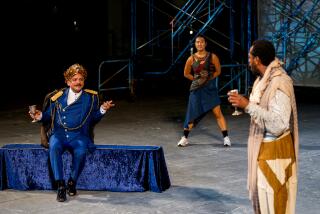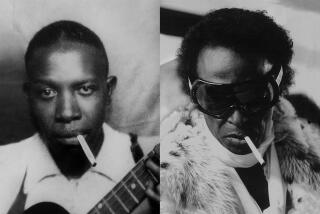Paul Mellon Never Let Ego Overshadow Generosity
- Share via
Paul Mellon’s father, Andrew W. Mellon (1855-1937), founded the National Gallery of Art, which opened in 1941. With his sister Ailsa Mellon Bruce (who died in 1969) and their foundation, Paul Mellon paid for the Gallery’s $94-million East building. Mellon helped lead the gallery for 60 years, and gave 913 artworks to the museum. He died Monday, at 91, at his home in Upperville, Va. In a phone conversation, Earl A. Powell III, who since 1992 has served as director of the National Gallery, after spending 12 years as director of the L.A. County Museum of Art, remembered the man behind such legendary largess.
*
I first met Paul Mellon when I came to work at the National Gallery for the first time, around 1976. I was there as a curatorial staff member for about four years before going to Los Angeles. Mr. Mellon was still very active on the board and was at the Gallery with some frequency. He was always the most approachable and pleasant person, in spite of the position he held and what he had done at the Gallery--of course he held a mythic status at the National Gallery--but he was genuinely considered one of the really good guys. He talked to everyone. He was extremely personable, and you really felt a great warmth.
Even after I came back to be director, by which time he had retired from his position as a trustee, he still attended board meetings. And he did so even last year. His pattern was that I would go to lunch with him at his Washington residence, or he would come to the Gallery. He would call--he was always very modest about it--and he would say, “Would it be possible for us to have lunch sometime?,” and I always felt that I would drop everything in the world to have lunch with Mr. Mellon.
The thing that impressed me most was when I first came back to the Gallery, he asked me to come to his home to have lunch, and I went over there never having really dealt with Mr. Mellon other than in a more casual way, to say hello at the Gallery. When we sat down for lunch, it was just he and I--that was the way he tended to prefer our relationship, just the two of us--and he had several letters that had been written to him. He put the letters on the table, and he said to me, “From time to time I will send things to you that I really think you could deal with, questions about works of art. But when I send them to you, I really don’t want you to drop everything that you’re doing and treat these as matters of great urgency. Just understand, I’m really just sending them along to you, for you to deal with in your own good time.” I thought that was a very charming and touching thing to do. It’s very easy with someone of that stature to think that you should drop everything. It made one very comfortable.
He was modest in his bearing; he always dressed impeccably, and he had a wonderful wry sense of humor. He always had a twinkle in his eye, and he always had a joke to tell. And he loved his martini at lunch, what he called an “arf and arf,” half gin and half vodka. Right to last fall, he always had to make sure we had the right combination for his martini--shaken, not stirred.
When he would come to the Gallery, he would bring a briefcase with him, and he always had newspaper articles that he’d clipped or that someone had sent to him about the art world. And he’d ask me about them. But he also loved talking about his horses. He talked as much about his horses as he did about matters relating to the Gallery. At one point he’d gotten greatly interested in the Civil War, much of which had taken place around the Mellon estate in Upperville, Va., and he had a bronze made of a Civil War horse, as a monument to the horses.
Often he would come to have lunch, then we would go look at exhibitions. He was particularly interested in the show we had last year, “Degas at the Races,” to which he lent his great Degas painting “Fallen Jockey.” He loved the show. He would go through the exhibitions and ask questions about individual works of art. I can’t ever remember his asking for anything that would have smacked of special privilege. He always came during the day, and of course he loved it, and the guards and staff loved it, because everyone knew him. He talked to everyone.
He was really a uniquely great gentleman. People kept saying right after he died, “It’s the end of an era.” I’ve been thinking about that, and I don’t really think it’s the end of an era, because I don’t really know anyone like Paul Mellon. I think he really was his own person, and while there were great people in that generation, and most of them are gone now, he really stands out.
More to Read
The biggest entertainment stories
Get our big stories about Hollywood, film, television, music, arts, culture and more right in your inbox as soon as they publish.
You may occasionally receive promotional content from the Los Angeles Times.










